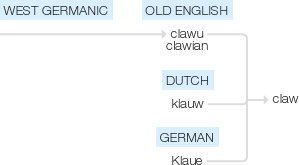Claw
Old English clawu (noun), clawian (verb), of West Germanic origin; related to Dutch klauw and German Klaue .
wiktionary
From Middle English clawe, from Old English clawu, from Proto-Germanic *klawō. Compare West Frisian klau, Dutch klauw, German Klaue, Danish klo, Norwegian klo, and Swedish klo.
From Middle English clawen, from Old English clawan, clāwan, *clēn, clawian, from Proto-Germanic *klawjaną.
etymonline
claw (n.)
"sharp, hooked, horny end of the limb of a mammal, bird, reptile, etc.," Old English clawu, earlier clea, "claw, talon, iron hook," from Proto-Germanic *klawo (source also of Old Frisian klawe "claw, hoe," Middle Dutch klouwe, Dutch klauw, Old High German klawa, German Klaue "claw").
Claw-foot in reference to carved furniture legs is from 1823; claw-and-ball attested from 1893. Claw-hammer, one having one end divided into two claws, is attested from 1769.
claw (v.)
Old English clawian "to scratch, claw," from the same root as claw (n.). Related: Clawed; clawing. Compare Dutch klaauwen, Old High German klawan, German klauen.
To claw back"regain by great effort" is from 1953; as a noun, an act of this, from 1969. Earlier clawback (n.) meant "one who fawns on another, a sycophant" (1540s), from phrase claw the back "flatter, curry favor" (late 14c.); compare the more recent expression scratch (someone's) back in a similar sense.
